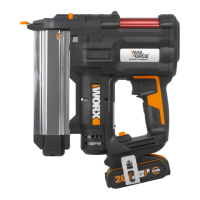8
20V Cordless 18 gauge Nail/Staple Gun
EN
power tool for operations different from those
intended could result in a hazardous situation.
5) Battery tool use and care
a) Recharge only with the charger specified by
the manufacturer. A charger that is suitable for
one type of battery pack may create a risk of fire
when used with another battery pack.
b) Use power tools only with specifically
designated battery packs. Use of any other
battery packs may create a risk of injury and fire.
c) When battery pack is not in use, keep it
away from other metal objects, like paper
clips, coins, keys, nails, screws or other
small metal objects, that can make a
connection from one terminal to another.
Shorting the battery terminals together may cause
burns or a fire.
d) Under abusive conditions, liquid may be
ejected from the battery; avoid contact.
If contact accidentally occurs, flush with
water. If liquid contacts eyes, additionally
seek medical help. Liquid ejected from the
battery may cause irritation or burns.
6) Service
a) Have your power tool serviced by a
qualified repair person using only identical
replacement parts. This will ensure that the
safety of the power tool is maintained.
NAILER SAFETY WARNINGS
1. Always assume that the tool contains
fasteners. Careless handling of the nailer can
result in unexpected firing of fasteners and
personal injury.
2. Do not point the tool towards yourself or
anyone nearby. Unexpected triggering will
discharge the fastener causing an injury.
3. Do not actuate the tool unless the tool is
placed firmly against the workpiece. If the
tool is not in contact with the workpiece, the
fastener may be deflected away from your target.
4. Disconnect the tool from the battery when
the fastener jams in the tool.While removing
a jammed fastener, the nailer may be accidentally
activated if it is plugged in.
5. Use caution while removing a jammed
fastener. The mechanism may be under
compression and the fastener may be forcefully
discharged while attempting to free a jammed
condition.
6. Do not use this nailer for fastening electrical
cables. It is not designed for electric cable
installation and may damage the insulation of
electric cables thereby causing electric shock or
fire hazards.
SAFETY WARNINGS FOR
BATTERY PACK
a) Do not dismantle, open or shred cells or
battery pack.
b) Do not short-circuit a battery pack. Do not
store battery packs haphazardly in a box or
drawer where they may short-circuit each
other or be short-circuited by conductive
materials. When battery pack is not in use,
keep it away from other metal objects, like paper
clips, coins, keys, nails, screws or other small
metal objects, that can make a connection from
one terminal to another. Shorting the battery
terminals together may cause burns or a fire.
c) Do not expose battery pack to heat or fire.
Avoid storage in direct sunlight.
d) Do not subject battery pack to mechanical
shock.
e) In the event of battery leaking, do not
allow the liquid to come into contact
with the skin or eyes. If contact has been
made, wash the affected area with copious
amounts of water and seek medical advice.
f) Seek medical advice immediately if a cell
or battery pack has been swallowed.
g) Keep battery pack clean and dry.
h) Wipe the battery pack terminals with a
clean dry cloth if they become dirty.
i) Battery pack needs to be charged before
use. Always refer to this instruction and
use the correct charging procedure.
j) Do not maintain battery pack on charge
when not in use.
k) After extended periods of storage, it may
be necessary to charge and discharge
the battery pack several times to obtain
maximum performance.
l) Battery pack gives its best performance
when it is operated at normal room
temperature (20 °C ± 5 °C).
m) When disposing of battery packs, keep
battery packs of different electrochemical
systems separate from each other.
n) Recharge only with the charger specified
by WORX. Do not use any charger other
than that specifically provided for use with
the equipment. A charger that is suitable for
one type of battery pack may create a risk of fire
when used with another battery pack.
o) Do not use any battery pack which is not
designed for use with the equipment.
p) Keep battery pack out of the reach of
children.
q) Retain the original product literature for
future reference.
r) Remove the battery from the equipment
when not in use.
s) Dispose of properly.
t) Do not mix cells of different manufacture,
capacity, size or type within a device.
u) Do not remove battery pack from its

